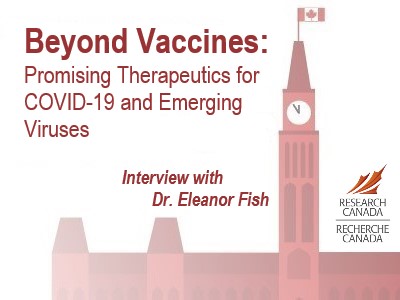

Research Canada speaks to Dr. Eleanor Fish, a scientific advisor to Canada’s COVID-19 Therapeutics Task Force
The federal government’s COVID-19 Therapeutics Task Force provides advice on the best and most promising treatments for COVID-19 procurement, whether these are still in development and merit support, including via applications to the federal Strategic Innovation Fund, or are existing medications. The Task Force also makes recommendations on therapies developed for a different use that may have an application to COVID-19.

Dr. Eleanor Fish is among 11 science advisors to the Therapeutics Task Force. A Professor of Immunology at the University of Toronto and a Senior Scientist at University Health Network, she investigates the behaviour of cytokines, which play a role in cell-to-cell communication during the body’s immune response. In a recent Research Canada interview with Ms. Deborah Gordon-El-Bihbety, President and CEO, Dr. Fish talked about the critical place of therapeutics in the battle against COVID-19, and their important role in preparing for the diseases and epidemics to come.
“Vaccines are a very important tool in our toolbox against COVID-19, but they are not a complete solution.”
– Dr. Eleanor Fish
RESEARCH CANADA: Canada’s vaccination campaign is under way, and we’ve been told that all Canadians who want a vaccine will have it by next fall. What role do therapeutics play, separate from vaccines, in the fight against COVID-19?
DR. ELEANOR FISH: Vaccines are a very important tool in our toolbox against COVID-19, but they are not a complete solution. Emerging variants of concern mean that current vaccines may become less effective as variants become the dominant strains. This is because the current vaccines target one region of the spike protein of SARS-CoV2 that is now mutating. Moreover, it remains unclear for some of the vaccines that have been approved for use, whether they reduce transmission in vaccinated individuals. Added to these caveats, for there to be herd immunity against SARS-CoV-2, at least 70% of Canadians will need to be vaccinated or have been recently infected. Plus, there will be those ineligible for vaccination right now – children, pregnant women, immunocompromised individuals – who are at risk of infection.
“We need to invest considerably into research around broad-spectrum antivirals – treatments that will have application regardless of the virus outbreak.”
– Dr. Eleanor Fish
All this to say that, despite vaccines being a very important tool in our toolbox against COVID-19, we do require effective therapeutics for both non-hospitalized and hospitalized COVID-19 cases. Therapeutics can be used prophylactically to protect those at high risk of infection, including healthcare professionals and frontline workers, and those post-exposure contacts of infected cases. Therapeutics that are effective antivirals can be used early on in COVID-19 cases, during the viral phase of the disease. Therapeutics that have utility in the pulmonary and inflammatory phases of the disease can be administered in both non-hospitalized and hospitalized individuals at the right time.
RESEARCH CANADA: What has the Therapeutics Task Force recommended, and what action has the federal government taken based on this advice?
DR. FISH: The Therapeutics Task Force has made several recommendations. We have recommended financial support for two companies – Arch Biopartners and Edesa Biotech Inc. – both working on therapeutics with COVID-19 application. Arch Biopartners is a Canadian clinical-stage biotech company that aims to advance Metablok, its lead drug candidate and a treatment for lung, liver and kidney inflammation in severe cases of COVID-19. The federal government has subsequently approved $6.7 million in funding for Phase II clinical trials of Metablok.
Edesa Biotech is a biopharmaceutical company based in Markham, Ontario. The federal government has approved $14 million for them to conduct Phase II clinical trials on a monoclonal antibody therapy for acute respiratory distress syndrome in COVID-19 cases. Monoclonal antibodies are lab-produced antibodies that target factors associated with disease. Edesa’s monoclonal antibody targets the inflammation in COVID-19. The federal government also executed procurement contracts for the antiviral medication remdesivir, on our recommendation, and it is now available for hospitalized COVID-19 cases. Finally, the Task Force continues to monitor clinical trial data for other Canadian and international therapeutics being evaluated for their use against COVID-19.
“There is compelling evidence that interferons should be considered as broad-spectrum antivirals for acute virus infections.”
– Dr. Eleanor Fish
RESEARCH CANADA: What other therapeutic projects are showing promise for saving the lives of Canadians and limiting the pandemic’s impact?
DR. FISH: I’d like to expand the question to include the promise these projects hold for helping Canada deal with other potential outbreaks and pandemics. To begin, we need to understand that while it’s tempting to think only of therapeutics that target a specific virus such as SARS-CoV-2 that causes COVID-19, the related research and development costs many millions of dollars and viruses mutate, leading to eventual resistance against the treatment that has cost so much. I would suggest we also need to invest considerably into research around broad-spectrum antivirals – that is, treatments that will have application regardless of the virus outbreak. I am interested in broad spectrum antivirals that will target common stages of the virus lifecycle—those which can be rapidly deployed, and to which viruses will not develop resistance.
My own research has looked at the use of interferons in treating acute virus infections. Interferons directly target many different stages of viral replication and also trigger our immune system to clear the virus. They have been used for years in the treatment of certain cancers and leukemias, chronic hepatitis C, and multiple sclerosis, and there is compelling evidence that interferons should be considered as broad-spectrum antivirals for acute virus infections, especially those that pose a threat for global outbreaks of severe disease.
“I believe that interferons offer us the opportunity to be prepared for any virus outbreak.”
– Dr. Eleanor Fish
My research group saw positive outcomes in the use of interferon treatment for SARS patients as well as people infected with Ebola virus. Those results prompted a study in Wuhan during the start of the SARS-CoV-2 outbreak. We found that inhaled interferon-alpha treatment sped up viral clearance from patients’ airways and reduced inflammation. That, in turn, has led to randomized, controlled phase III clinical trials. I’m currently involved in a trial examining the potential protective effects of interferon for post-exposure contacts of an infected COVID-19 case. From my perspective, interferons offer us the opportunity to be prepared for any virus outbreak.
RESEARCH CANADA: What strengths within our health research enterprise and health innovation system can be harnessed in this quest for effective therapeutics over the long-term, and where is there a need for change? What roles should be played by government, life science companies, the academic and charitable sectors?
DR. FISH: Collaboration is our strength! This pandemic has taught us that public and private sector collaboration is essential. Academic science has contributed to mathematical modelling for effective population interventions; public and private biomedical research has enabled rapid development of vaccines, therapeutics and new technology platforms; charitable foundations offer financial support; and government at all levels play an important role in providing financial resources and facilitating regulatory approvals. However, our current funding sources promote competition, leading to disconnected silos of excellence across the country. If we want to bring those together and build out collaborative networks for biomedical research, clinical trials and bio-manufacturing practices, governments must allocate the resources to enable this massive Canadian infrastructure.
The Therapeutics Task Force has meanwhile identified opportunities where our healthcare system may be strengthened for future pandemic preparedness and has relayed this information to the federal government. By bringing together our outstanding human resources and facilities, providing financial resources and platforms, and protecting intellectual property and innovation, Canada will position itself extremely well for the future.
